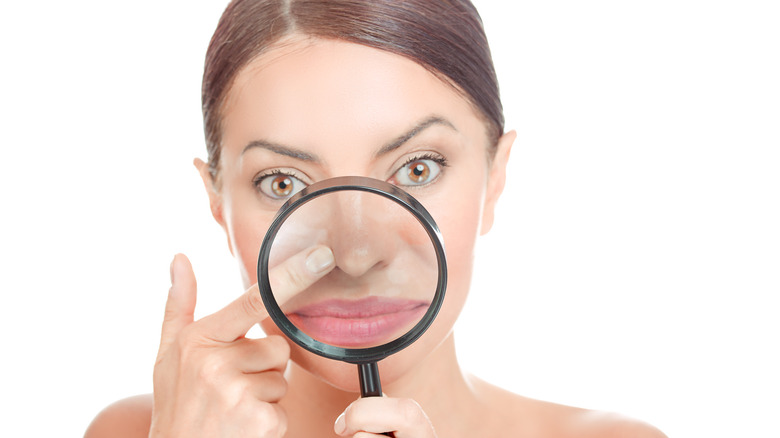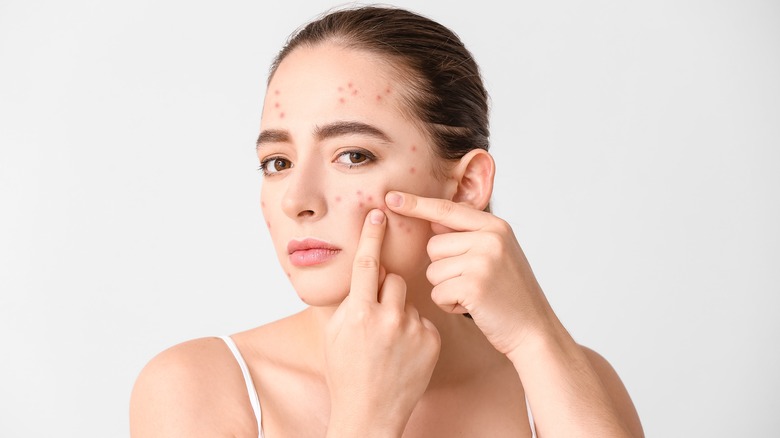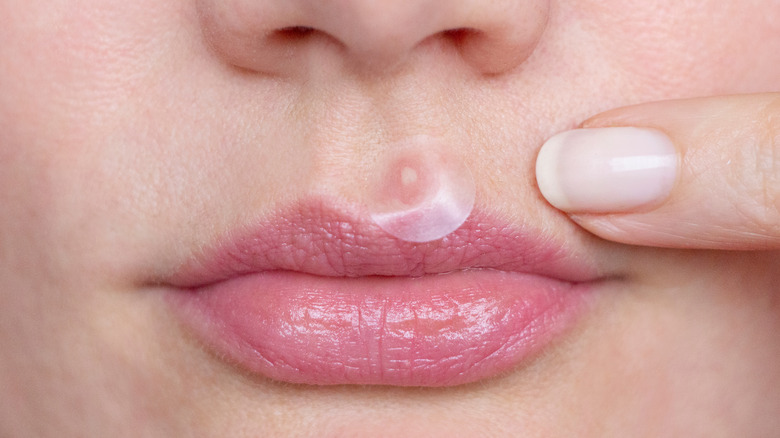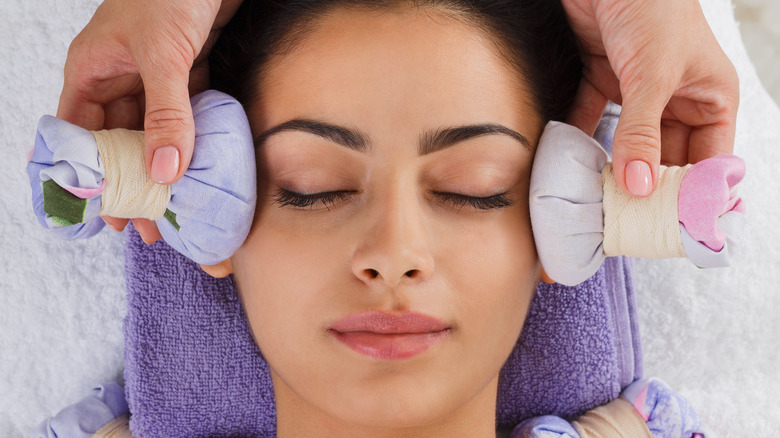Never Pop A Pimple On This Part Of Your Face. Here's Why
That irritation of feeling a pimple on your face growing under the skin is like no other. You might not have the patience to wait for the unwelcome guest to run its course before you go about trying to get rid of it. But before you wash your hands and have the cotton balls on standby, think twice before you start to try and pop a pimple on a part of your face known as "the triangle of death."
The name may sound intense, and with good reason. As Dr. Amesh A. Adalja, a board-certified infectious disease physician at Johns Hopkins Center for Health Security, explains to Healthline, "The triangle of death is a colloquial term for an area of the face that includes the region of the nose and corners of the mouth. This area is connected via blood vessels to areas of the skull where infections can spread very rapidly and become more serious." If you have a pimple or any type of blemish in this area, avoid touching it! Adalja goes on to say that this area is where staph infections are likely to arise.
What is a staph infection? According to Mayo Clinic, a staph infection is caused by the staphylococcus bacteria. These germs infect the skin. While they often disappear on their own, they can become deadly if the infection gets worse — by picking at it, for example — and the bacteria invades deeper, entering the bloodstream.
Possible complications from popping a pimple
When a staph infection enters the bloodstream, it can carry staph to other parts of the body, including the brain, lungs, and other organs (via Penn Medicine). One particularly nasty kind of staph infection is methicillin-resistant Staphylococcus aureus (MRSA), a staph infection that resists typical antibiotic treatments. Athletes and people who share towels or razors may be more at risk for getting a MRSA infection. And picking or popping a pimple can provide an opening for staph to enter the skin. Staph infections can then appear as a painful, red, swollen area on the skin or a pus-filled bump that may look like a boil — or a pimple.
The Cleveland Clinic says you probably won't die from popping a pimple, but technically, it is possible. In rare cases, an infection in the triangle of death, also called the "danger triangle," can lead to septic cavernous sinus thrombosis, a blood clot in the sinus cavity. This blood clot can cause serious, life-threatening illnesses, including brain infection, brain abscess, meningitis, pneumonia, infected blood clots in the bloodstream, and stroke.
Serious infections are rare but can be deadly
After the harmful bacteria has entered the bloodstream from the triangle of death, it only has to travel a short distance before it enters the brain. Heather Free, PharmD and a spokesperson for the American Pharmacist Association, tells Healthline, "While infections of this area are rare — due to antibiotics — the triangle of death is a particular area of the face that if the skin is broken and the inside of our body is exposed to bacteria, it can invade and have access to the body's control center."
Considering how serious an infection can get in the triangle of death, you may also want to avoid plucking nose hairs or picking at a stubborn booger as well. It may be hard to refrain from trying to pop a growing pimple on the tip of your nose, or one that has sprouted right between your Cupid's bow. But now that we've heard about the triangle of death, it may be best to let these unwanted guests stick around until they disappear on their own.
Pimple popping can cause scarring and infection
Even if you don't contract a life-threatening condition, picking at your pimples can cause other less serious but still annoying infections, like boils or cellulitis (per WebMD). Dermatologist Alok Vij, MD, tells the Cleveland Clinic, "There is the possibility for a facial infection to become an infection that impacts the rest of your body ... Thankfully, it's relatively unlikely, but whenever there's a violation of the skin and interaction with bacteria, there's always a possibility for infection, which can lead to greater health concerns."
Dr. Vij says, "Honestly, you should always avoid popping pimples. Doing so can lead to inflammation, post-inflammatory hyperpigmentation and scarring — and, of course, infection." This goes double for the danger triangle. WebMD recommends moisturizing your skin to keep it free from peeling or cracking, and cleaning any cuts or scratches daily with soap and water. Cover cuts with a topical ointment like petroleum jelly to prevent infection. And do not pop a pimple if you have one! If you do have pimples, especially in the danger triangle, Cleveland Clinic advises applying a warm compress to draw out pus and speed up the healing process. Cover zits that have already opened up with a blemish patch to dry them out and protect against infection. Finally, see a dermatologist if needed.



